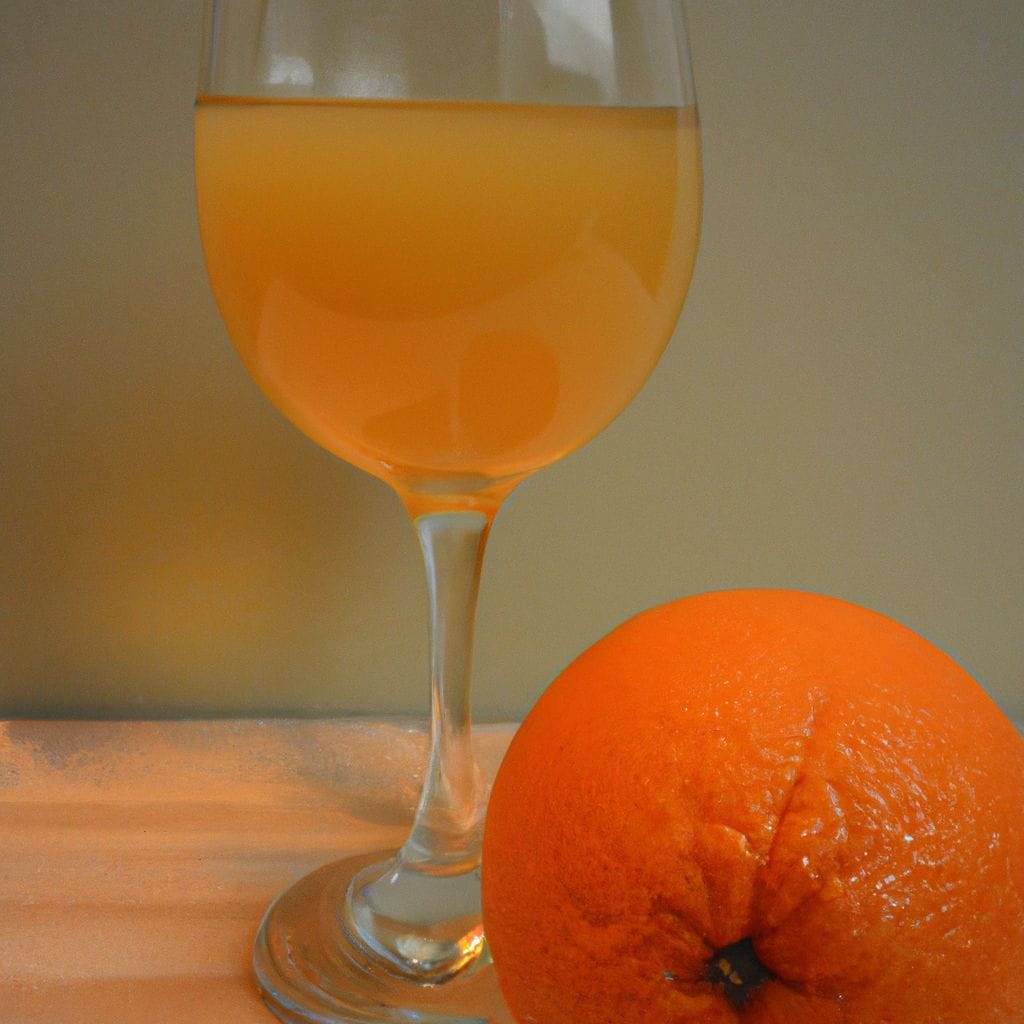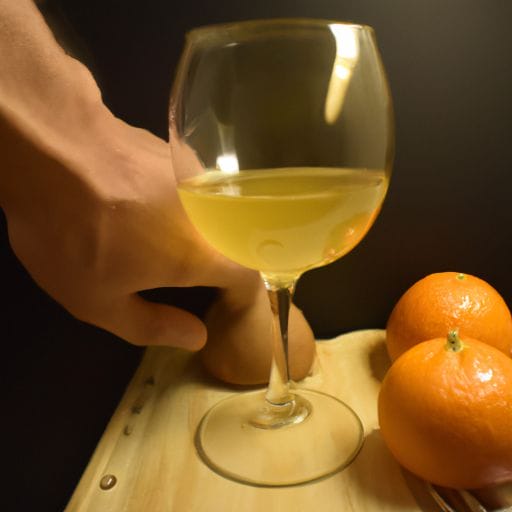Orange wine is a unique type of wine that has been gaining popularity in recent years. It is made from white grapes that have been left to macerate with their skins, giving it a unique flavor and color. Orange wine has a complex flavor profile that can range from sweet and fruity to dry and tannic. It can also have notes of citrus, honey, and even spices. It is a great choice for those looking for something different and unique. In this article, we will explore what orange wine tastes like and how to best enjoy it.
Exploring the Unique Flavor Profile of Orange Wine
Contents
- 1 Exploring the Unique Flavor Profile of Orange Wine
- 2 A Beginner’s Guide to Orange Wine: What to Expect
- 3 The Difference Between Orange Wine and White Wine
- 4
- 5 How to Pair Orange Wine with Food
- 6 The History of Orange Wine: From Ancient Times to Today
- 7 The Benefits of Drinking Orange Wine
- 8 The Best Orange Wines to Try Now
- 9 The Pros and Cons of Making Orange Wine at Home
- 10 FAQs:
- 11 1. What does orange wine taste like?
- 12 2. Is orange wine sweet or dry?
- 13 3. What food pairs well with orange wine?
- 14 4. Is orange wine the same as rosé?
- 15 5. Is orange wine the same as white wine?
- 16 6. Is orange wine the same as red wine?
- 17 7. Is orange wine the same as sparkling wine?
- 18 8. Is orange wine the same as dessert wine?
- 19 Conclusion
Orange wine is a unique and exciting type of wine that is gaining popularity among wine enthusiasts. It has a distinct flavor profile that sets it apart from other wines, making it a great choice for those looking to explore something new.
So, what is orange wine? It is a type of white wine made from white grapes that have been left to macerate with their skins for an extended period of time. This process gives the wine its unique orange hue and imparts a range of flavors and aromas that are not found in other wines.
The flavor profile of orange wine is complex and varied. It has a distinct citrusy aroma, with notes of tangerine, orange blossom, and honey. On the palate, it has a full-bodied texture with a hint of sweetness and a pleasant acidity. The flavor is often described as being reminiscent of apricots, peaches, and honey.
Orange wine pairs well with a variety of dishes, from light salads to rich, creamy pastas. It is also a great choice for sipping on its own. Its unique flavor profile makes it a great conversation starter and a great way to explore something new.
So, if you’re looking to explore something new and exciting, why not give orange wine a try? With its unique flavor profile and versatility, it’s sure to be a hit at your next gathering. Cheers!
A Beginner’s Guide to Orange Wine: What to Expect
Welcome to the wonderful world of orange wine! If you’re new to this unique style of wine, you’re in for a treat. Orange wine is a type of white wine made with extended skin contact, giving it a unique flavor and color. It’s a great way to explore the world of wine and discover something new.
So, what can you expect from orange wine? First, you’ll notice its unique color. Orange wine is usually a deep golden or amber color, and it can range from light to dark. It’s also usually a bit cloudy, which is a sign of its natural fermentation process.
When it comes to flavor, orange wine is usually quite complex. You’ll find notes of citrus, stone fruit, and even some floral and herbal notes. It’s often described as having a “funky” flavor, which is part of its charm.
Orange wine is also usually quite dry, with a higher acidity than other white wines. This makes it a great pairing for food, as it can stand up to bold flavors.
Finally, orange wine is usually quite affordable. It’s a great way to explore the world of wine without breaking the bank.
So, if you’re looking for something new and exciting, give orange wine a try. You’ll be sure to find something you love!
The Difference Between Orange Wine and White Wine
Orange wine is a unique and exciting type of wine that is gaining popularity among wine enthusiasts. It is made from white grapes, but the juice is left in contact with the grape skins for a longer period of time than with white wine. This process gives orange wine its distinctive orange hue and unique flavor profile.
Orange wine has a more complex flavor than white wine. It has a fuller body and a more intense aroma. The flavor profile of orange wine can range from floral and fruity to earthy and spicy. It can also have notes of honey, nuts, and even smoke.
Orange wine is also higher in tannins than white wine. Tannins are compounds found in the skins and seeds of grapes that give wine its structure and complexity. The longer the juice is left in contact with the skins, the more tannins are extracted. This makes orange wine more full-bodied and tannic than white wine.
Orange wine is best served slightly chilled, as it can become overly tannic if served too warm. It pairs well with a variety of foods, including grilled meats, roasted vegetables, and aged cheeses.
So, if you’re looking for something new and exciting to try, give orange wine a try! It’s sure to be a hit with your friends and family.
How to Pair Orange Wine with Food
Orange wine is a unique and delicious type of wine that is gaining popularity among wine lovers. It is made from white grapes that are left to macerate with their skins, giving it a unique flavor and color. If you’re looking to pair orange wine with food, you’re in luck! This type of wine is incredibly versatile and pairs well with a variety of dishes. Here are some tips for pairing orange wine with food.
Start by considering the flavor profile of the orange wine. Is it light and fruity, or more full-bodied and earthy? This will help you determine what type of food to pair it with. For lighter, fruitier wines, try pairing it with lighter dishes such as salads, seafood, and white meats. For fuller-bodied wines, try pairing it with heartier dishes such as grilled meats, stews, and roasted vegetables.
When pairing orange wine with food, it’s important to consider the acidity of the wine. Orange wines tend to be more acidic than other types of wine, so it’s important to pair them with foods that can stand up to the acidity. Try pairing orange wine with dishes that have a bit of sweetness, such as roasted root vegetables or a creamy risotto.
Finally, don’t be afraid to experiment! Orange wine is a great way to add a unique flavor to your meal. Try pairing it with dishes you wouldn’t normally think of, such as a spicy curry or a rich chocolate dessert. You may be surprised at how well the flavors complement each other.
Pairing orange wine with food can be a fun and delicious experience. With a bit of experimentation, you’ll be able to find the perfect pairing for any dish. So grab a bottle of orange wine and get cooking!
The History of Orange Wine: From Ancient Times to Today
Orange wine has been around for centuries, and its history is as fascinating as its flavor. From ancient times to today, orange wine has been a beloved beverage for many cultures around the world.
The earliest known mention of orange wine dates back to the 5th century BC in the writings of the Greek philosopher Xenophon. He described a type of wine made from white grapes that had been left to macerate on their skins for a period of time, resulting in a deep orange hue. This process, known as skin contact, is still used today to make orange wine.
In the Middle Ages, orange wine was popular in Italy, where it was known as “ramato” or “coppato”. This style of wine was made from white grapes that were left to macerate on their skins for a period of time, resulting in a deep orange hue. This process was used to create a unique flavor profile that was unlike any other wine.
In the 19th century, orange wine was popularized in France, where it was known as “vin gris”. This style of wine was made from white grapes that were left to macerate on their skins for a period of time, resulting in a deep orange hue. This process was used to create a unique flavor profile that was unlike any other wine.
Today, orange wine is gaining popularity around the world. It is made from white grapes that are left to macerate on their skins for a period of time, resulting in a deep orange hue. This process is used to create a unique flavor profile that is unlike any other wine.
Orange wine is a unique and delicious beverage that has been enjoyed for centuries. From ancient times to today, orange wine has been a beloved beverage for many cultures around the world. Whether you’re looking for a unique flavor profile or just want to try something new, orange wine is sure to please.
The Benefits of Drinking Orange Wine
Orange wine is a unique and delicious beverage that is becoming increasingly popular among wine enthusiasts. This type of wine is made from white grapes that have been left to macerate with their skins, giving it a unique flavor and color. Not only does orange wine taste great, but it also offers a variety of health benefits. Here are some of the benefits of drinking orange wine:
1. Rich in Antioxidants: Orange wine is rich in antioxidants, which can help protect your body from free radicals and reduce inflammation. This can help reduce your risk of developing certain diseases, such as cancer and heart disease.
2. Improved Digestion: Orange wine can help improve your digestion by stimulating the production of digestive enzymes. This can help your body break down food more efficiently and absorb more nutrients.
3. Improved Skin Health: The antioxidants in orange wine can help protect your skin from damage caused by free radicals. This can help reduce the signs of aging and keep your skin looking youthful and healthy.
4. Improved Mental Health: Orange wine can help improve your mental health by reducing stress and anxiety. The antioxidants in orange wine can also help improve your mood and reduce depression.
Orange wine is a delicious and unique beverage that can offer a variety of health benefits. Not only does it taste great, but it can also help protect your body from free radicals, improve your digestion, and improve your mental health. So, why not give orange wine a try and see what it can do for you?
The Best Orange Wines to Try Now
Are you looking to try something new and exciting? Look no further than orange wines! Orange wines are a unique type of white wine made from white grapes that have been left in contact with their skins for an extended period of time. This process gives the wine a unique flavor and color, ranging from a light orange to a deep amber hue.
If you’re looking to try orange wines, here are some of the best ones to try now:
1. Radikon Slatnik: This Slovenian orange wine is made from the Ribolla Gialla grape and is aged in large oak barrels for up to two years. It has a light orange hue and a complex flavor profile with notes of honey, apricot, and herbs.
2. Movia Ribolla: This Slovenian orange wine is made from the Ribolla Gialla grape and is aged in large oak barrels for up to two years. It has a light orange hue and a complex flavor profile with notes of honey, apricot, and herbs.
3. La Stoppa Macchiona: This Italian orange wine is made from the Malvasia grape and is aged in large oak barrels for up to two years. It has a deep amber hue and a complex flavor profile with notes of honey, apricot, and herbs.
4. Gravner Anfora: This Italian orange wine is made from the Ribolla Gialla grape and is aged in large clay amphorae for up to two years. It has a light orange hue and a complex flavor profile with notes of honey, apricot, and herbs.
5. Josko Gravner Breg: This Italian orange wine is made from the Ribolla Gialla grape and is aged in large clay amphorae for up to two years. It has a light orange hue and a complex flavor profile with notes of honey, apricot, and herbs.
So, if you’re looking to try something new and exciting, why not give orange wines a try? With their unique flavor profiles and beautiful hues, these wines are sure to please. Cheers!
The Pros and Cons of Making Orange Wine at Home
Making orange wine at home can be a fun and rewarding experience. It can also be a great way to save money and enjoy a unique flavor. However, there are some pros and cons to consider before you get started.
Pros
1. Cost Savings: Making orange wine at home can be much cheaper than buying it from a store. You can save money on ingredients and equipment, and you can make as much or as little as you want.
2. Unique Flavor: Orange wine has a unique flavor that you won’t find in any other type of wine. It’s a great way to experiment with different flavors and create something truly unique.
3. Fun Activity: Making orange wine can be a fun and rewarding activity. It’s a great way to spend time with friends and family, and it can be a great way to learn about the process of winemaking.
Cons
1. Time Consuming: Making orange wine can be a time-consuming process. It can take several weeks or even months to make a good batch of orange wine.
2. Risk of Failure: There is always a risk of failure when making orange wine. If you don’t follow the instructions carefully, you could end up with a bad batch of wine.
3. Equipment: You will need to purchase or rent some specialized equipment to make orange wine. This can be expensive and may not be worth the cost if you’re only making a small batch.
Making orange wine at home can be a fun and rewarding experience. However, it’s important to consider the pros and cons before you get started. If you’re willing to put in the time and effort, you can create a unique and delicious orange wine that you can enjoy for years to come.
FAQs:
1. What does orange wine taste like?
Orange wine has a unique flavor profile that can vary depending on the grape variety used and the winemaking process. Generally, orange wines have a slightly sweet, fruity flavor with notes of citrus, honey, and spice. They can also have a slightly tannic, earthy finish.
2. Is orange wine sweet or dry?
Orange wines can be either sweet or dry, depending on the winemaking process. Generally, orange wines are made with a longer maceration period, which can result in a slightly sweeter flavor.
3. What food pairs well with orange wine?
Orange wines pair well with a variety of dishes, including roasted vegetables, grilled fish, and creamy cheeses. They also pair well with spicy dishes, such as curries and stir-fries.
4. Is orange wine the same as rosé?
No, orange wine is not the same as rosé. Rosé is made from red grapes that are fermented with their skins, while orange wine is made from white grapes that are fermented with their skins.
5. Is orange wine the same as white wine?
No, orange wine is not the same as white wine. White wine is made from white grapes that are fermented without their skins, while orange wine is made from white grapes that are fermented with their skins.
6. Is orange wine the same as red wine?
No, orange wine is not the same as red wine. Red wine is made from red grapes that are fermented with their skins, while orange wine is made from white grapes that are fermented with their skins.
7. Is orange wine the same as sparkling wine?
No, orange wine is not the same as sparkling wine. Sparkling wine is made by adding carbon dioxide to the wine, while orange wine is made from white grapes that are fermented with their skins.
8. Is orange wine the same as dessert wine?
No, orange wine is not the same as dessert wine. Dessert wines are typically made from grapes that are left on the vine longer, while orange wines are made from white grapes that are fermented with their skins.
Conclusion
In conclusion, orange wine has a unique flavor profile that is unlike any other type of wine. It has a complex flavor that is both sweet and tart, with notes of citrus, honey, and spice. It is a great choice for those looking for something different and unique to try. Orange wine pairs well with a variety of dishes, making it a great choice for any occasion.














